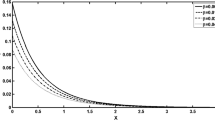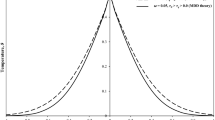Abstract
A new model of two-temperature generalized thermo-viscoelasticity theory based on memory-dependent derivative is constructed. The equations of the new model are applied to one-dimensional problem of a half-space. The bounding surface is taken to be traction free and subjected to a time dependent thermal shock. Laplace transforms technique is used. A direct approach is applied to obtain the exact formulas of heat flux, temperature, stresses, displacement and strain in the Laplace transform domain. Application is employed to our problem to get the solution in the complete form. The considered variables are presented graphically and discussions are made.
Similar content being viewed by others
References
N. Tschoegl, Time dependence in material properties: An overview mechanics, Time Dependent Materials, 1 (1997) 3–31.
B. Gross, Mathematical structure of the theories of viscoelasticity, Hemann, Paris (1953).
C. Atkinson and R. Craster, Theoretical aspects of fracture mechanics, Progress Aerospace Science, 31 (1995) 1–83.
K. Rajagopal and G. Saccomandi, On the dynamics of nonlinear viscoelastic solids with material moduli that depend upon pressure, International Journal of Engineering Science, 45 (2007) 41–54.
A. M. Zenkour, Viscoelastic analysis of an exponentially graded sandwich plate, Journal of Mechanical Science and Technology, 26 (2012) 889–898.
J. Duan, Y. Lei and D. Li, Enriched finite element method for 2-D and 3-D blunt crack problems in a viscoelastic medium, Journal of Mechanical Science and Technology, 26 (2012) 869–882.
P. J. Chen, M. E. Gurtin and W. O. Williams, On the thermodynamics of non-simple elastic materials with two temperatures, ZAMP, 20 (1969)107–112.
M. Biot, Thermoelasticity and irreversible thermodynamics, Journal of Applied Physics, 27 (1956) 240–253.
C. Cattaneo, A form of heat conduction equation which eliminates the paradox of instantaneous propagation, Comptes Rendus Acadimic Sciences, 247 (1958) 431–433.
J. Ignaczak, Generalized thermoelasticity and its applications, In: Hetnarski, RB (Ed), Thermal Stresses III, Elsevier, New York, 3 (1989) 279–354.
D. S. Chandrasekharaiah, Hyperbolic thermoelasticity: A review of recent Literature, Applied Mechanics Review, 51 (1998) 705–729.
M. A. Ezzat and A. A. El-Bary, State space approach of two-temperature magneto -thermoelasticity with thermal relaxation in a medium of perfect conductivity, International Journal of Engineering Science, 47 (2009) 618–630.
M. A. Ezzat, A. A. El-Bary and A. S. El-Karamany, Twotemperature theory in generalized magneto-thermo-viscoelasticity, Canadian Journal of Physics, 87 (2009) 329–336.
M. A. Ezzat, State space approach to unsteady twodimensional free convection flow through a porous medium, Canadian Journal of Physics, 72 (1994) 311–317.
M. A. Ezzat, The relaxation effects of the volume properties of electrically conducting viscoelastic material, Material Science and Engineering B, 130 (2006) 11–23.
R. Quintanilla, On existence, structural stability, convergence and spatial behavior in thermoelasticity with two temperatures, Acta Mechanica, 168 (2004) 61–73.
A. S. El-Karamany and M. A. Ezzat, Convolutional variational principle, reciprocal and uniqueness theorems in linear fraction-al two-temperature thermoelasticity, Journal of Thermal Stresses, 34 (2011) 264–284.
M. A. Ezzat and A. S. El-Karamany, Two-temperature theory in generalized magneto-thermoelasticity with two relaxation times, Meccanica, 46 (2011) 785–794.
I. A. Abbas, Eigenvalue approach for an unbounded medium with a spherical cavity based upon two-temperature generalized ther moelastic theory, Journal of Mechanical Science and Technology, 28 (2014) 4193–4198.
M. A. Ezzat and H. M. Youssef, Two-temperature theory in three-dimensional problem for thermoelastic half space subjected to ramp type heating, Mechanics of Advanced Materials and Structures, 21 (2014) 293–304.
R. Kumar, M. Kaur and S. Rajvanshi, Wave propagation in micropolar thermoelastic layer with two temperatures, Journal of Vibration and Control, 20 (2014) 458–469.
Y. Z. Povstenko, Fractional heat conduction equation and associated thermal Stresses, Journal of Thermal Stresses, 28 (2015) 83–102.
H. H. Sherief, A. A. El-Said and A. Abd El-Latief, Fractional order theory of thermoelasticity, International Journal of Solids and Structures, 47 (2010) 269–275.
M. A. Ezzat, Thermoelectric MHD non-Newtonian fluid with Fractional derivative heat transfer, Physica B, 405 (2010) 4188–4194.
M. A. Ezzat, Magneto-thermoelasticity with thermoelectric properties and fractional derivative heat transfer, Physica B, 406 (2011) 30–35.
M. A. Ezzat and A. S. El-Karamany, Fractional order heat conduction law in magneto-thermoelasticity involving two temperatures, ZAMP, 62 (2011) 937–952.
M. A. Ezzat and A. S. El-Karamany, Theory of fractional order in electro-thermoelasticity, European Journal of Mechanics-A/Solid, 30 (2011) 491–500.
M. A. Ezzat and A. S. El-Karamany, Fractional order theory of a perfect conducting thermoelastic medium, Canadian Journal of Physics, 89 (2011) 311–318.
I. Podlubny, Fractional differential equations, Academic Press, New York (1999).
K. Diethelm, Analysis of fractional differential equation: an application-oriented exposition using differential operators of caputo type, springer-verlag, Berlin, Heideberg (2010).
M. Caputo, Linear models of dissipation whose Q is almost frequency independent II, Geophysics Journal of the Royal Astronomy Society, 13 (1967) 529–539.
J. L. Wang and H. F. Li, Surpassing the fractional derivative: Concept of the memory-dependent derivative, Computers and Mathematics with Applications, 62 (2011) 1562–1567.
Y.-J. Yu, W. Hu and X.-G. Tian. A novel generalized thermoelasticity model based on memory-dependent derivative, International Journal of Engineering Science, 81 (2014) 123–134.
H. Shulman and Y. Shulman, A generalized dynamical theory of thermo-elasticity, Mechanics and Physics of Solids, 15 (1967) 299–309.
G. Honig and U. Hirdes, A method for the numerical inversion of the Laplace transform, Journal of Computations and Applied Mathematics, 10 (1984) 113–132.
M. I. Othman, M. A. Ezzat, S. A. Zaki and A. S. El-Karamany, Generalized thermo-viscoelastic plane waves with two relaxation times, International Journal of Engineering Science, 40 (2002) 1329–1347.
M. A. Ezzat, A. S. El-Karamany and A. A. El-Bary, Generalized thermo-viscoelasticity with memory-dependent derivatives, International Journal of Mechanical Sciences, 89 (2014) 470–475.
H. H. Shereif and A. Abd El-Latief, Application of fractional order theory of thermoelasticity to a 1D problem for a half-space, ZAMM, 94 (2014) 509–515.
Author information
Authors and Affiliations
Corresponding author
Additional information
Recommended by Associate Editor Seong Beom Lee
Magdy A. Ezzat is a professor of Applied Mathematics. He received his Ph.D. at Russia from Georgia University in 1988 and now he is a lecture in faculty of Education, Alexandria University. His current research is focused on MHD and generalized thermoelasticity theory. He published a review of state space approach to solids and fluids in Canadian Journal of Physics, 2008 and participated in the research encyclopedia of Thermal stresses, 2014.
Alaa Abdelbary El-Bary is a profeessor of Computational and Applied Mathematics. He obtained his B.sc., Msc. and Ph.D. in 1988, 1996 and 1999, respectively. Abdelbary interested and research oriented in the field of Applied Mathematics (Hydrodynamics and Thermoelasticity) in general and published more than 70 research papers in international reviewed journals and conferences.
Rights and permissions
About this article
Cite this article
Ezzat, M.A., El-Bary, A.A. Memory-dependent derivatives theory of thermo-viscoelasticity involving two-temperature. J Mech Sci Technol 29, 4273–4279 (2015). https://doi.org/10.1007/s12206-015-0924-1
Received:
Revised:
Accepted:
Published:
Issue Date:
DOI: https://doi.org/10.1007/s12206-015-0924-1




